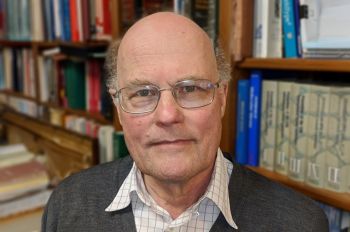Physics’ Zack Sullivan Co-Chairs CTEQ Summer School on Perturbative QCD in Pittsburgh
Zack Sullivan, associate professor of physics, will co-chair the Coordinated Theoretical-Experimental Project on QCD (CTEQ) Summer School on QCD and Electroweak Phenomenology at the University of Pittsburgh, July 18-28.
The CTEQ Summer School will provide a focused introduction to perturbative quantum chromodynamics (QCD) along with applications and recent experimental results. It is designed for advanced graduate students and recent Ph.D.s. Additionally, the school will include hands-on Monte Carlo tutorial sessions organized with the MCnet Collaboration.
Sullivan first taught at the school in 2007 and has helped to organize it since 2011. His research in theoretical particle physics focuses on phenomenology of the strong and weak interactions, and physics beyond the Standard Model.
A full list of topics includes the following.
Focused Introductory Reviews:
- Introduction to the Parton Model and Perturbative QCD
- Introduction to Monte Carlo Event Generators
- Deeply Inelastic Scattering
- Higgs Boson Physics
- Vector Bosons / Direct Photons
- Production and Structure of High Energy Jets
- Heavy Quarks
In-depth Analysis and Phenomenology:
- Monte Carlo Tutorial
- Higgs at Hadron Colliders
- QCD/EWK/Top/Searches at Hadron Colliders
- PDFs and Global Fits
- Neutrino Physics
- Intensity Frontier
- Electron-Ion Collider and Related Topics
- The Standard Model and Beyond
- Higher-order QCD and EW Calculations and Matching to Parton Showers
The international CTEQ Summer School has educated over 1,000 physicists since 1992. This year, the school is sponsored by the U.S. Department of Energy, National Science Foundation, Fermi National Accelerator Laboratory, MC-Net, and Pittsburgh Particle Physics, Astrophysics, and Cosmology Center (PITT PACC).
CTEQ is a collaboration of 39 theorists and experimentalists at 22 universities and five laboratories who work on a broad range of research projects and cooperative enterprises in high-energy physics centered on QCD and its implications in all areas of the Standard Model and beyond. The collaborating institutions include Baylor University, CERN, Fermilab, Florida State University, Hampton University, Illinois Institute of Technology, Iowa State, Jefferson Lab, Karlsruher Institut für Technologie, Michigan State University, Northwestern University, Oregon State University, Penn State University, SLAC National Accelerator Laboratory, Southern Methodist University, SUNY Buffalo, SUNY Stony Brook, Taipei Municipal University of Education, Universität Münster, Universität Tübingen, University of California Riverside, University of Illinois at Chicago, University of Oregon, University of Pittsburgh, University of Rochester, University of Washington, and University of Witwatersrand.
QCD is the strong force of nature that binds nuclei together. Perturbation theory is used calculate the QCD interactions of particles at high energy colliders, and to predict the distribution of particles produced when protons are annihilated.




